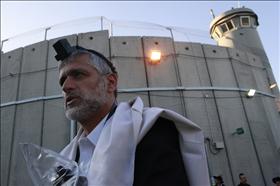Insult to Injury
What was Eli Yishai thinking?
Eli Yishai's recent comparison of the Six Day War and the Second Lebanon War were not only offensive, they were just plain incorrect.
Uri Regev 23/01/2012 13:16
Tags: Eli Yishai · Shas · Uri Regev · Haredim in the Army · Army exemptions

Chairman of Shas and Minister of Internal Affairs,Eli Yishai, laying phylacteries at Rachel's Tomb on the traditional day of visiting her grave. Photograph by: Uri Lenz, Flash 90.
And we thought we had heard it all. To explain the difference between the victorious Six Day War and the obstacle-ridden Second Lebanon War, Interior Minister Eli Yishai was recorded saying the Israel Defence Forces succeeded in the Six Day War because “Each and every Jew that went to battle looked up to the Creator” whereas in Lebanon, soldiers said “It is my own might and power” Yishai continued on to say “This is a great lesson. When all Arab states are against the Jewish people, what will save the Jewish people is those who study of Torah, who bring the masses back to the religious fold, and repentance.”
This horrific incident represents the darker side of the unholy alliance between religion and state in Israel. Under normal circumstances, someone like Eli Yishai would not serve in a government cabinet position, and his party would not be a welcome partner in the governmental coalition. His anti-historical account would call into question his capacity to act intelligently as a high ranking government official. Unfortunately, the nature of Israeli politics has made it not only possible, but in the minds of many, seen to be as natural as the elements.
After understandable fury from political circles, bereaved parents and civil society organizations, Yishai publicly “apologized” saying he regrets having hurt the bereaved parents which was not his intention.
His apology makes his earlier comments even more egregious. He attempts to find refuge in the standard line uttered by politicians when they are caught in an embarrassing situation: “My comments were distorted and taken out of context” Yishai responded. Tell me, Minister Yishai, what exactly about your quote was taken out of context? Out of context or not, Yishai’s comments are ahistorical and hypocritical. Yishai has not retracted these key statements, leaving us to assume he still believes in their truth.
If Yishai were to look into the actual history of the wars, he would realize that a vast majority of the soliders in the Six Day War were recruits from secular Zionist backgrounds; there was only one religious high ranking officer, Col. Shmuel Gonen. Gonen had previously studied full time in yeshiva, but contrary to the policies supported by Yishai’s own party, left his studies to take part in the army. In contrast, the Second Lebanon War was largely staffed by national religious soldiers because of changing demographics in Israeli Jewish society. Following Yishai’s logic, this would indicate, in fact, that the more religious soldiers, the less successful the war effort will be.
Eli Yishai: This is a great lesson. When all Arab states are against the Jewish people, what will save the Jewish people is those who study of Torah, who bring the masses back to the religious fold, and repentance.
While fully appreciating the potential efficacy of faith and prayer, it is another matter altogether to distort the facts to fit your religious purpose, claiming knowledge of Divine conduct in the outcome of wars without any humility. Had Yishai said “Faith and prayer strengthen Israel and its ability to meet external threats”, very few would have faulted him. His ridiculous characterization of the Six Day War as if the prayers of soldiers were the secret to Israel’s victory, and his debasement of the memory of fallen soldiers in the Lebanon War are insulting to both the army and the country. It tells more about Yishai’s own twisted sense of history, manipulative character and fundamentalist faith than it does about any rational evaluation of these historic events.
Either Yishai believes what he said, in which case, his perception of reality is suspect, or he does not believe what he said, in which case, he is a manipulative liar. In either case, he is unfit to serve.
One such soldier who fought in the Lebanon War spoke on the radio saying “Yishai is wrong. We prayed! We prayed so much! We prayed for more soldiers and more equipment.” This soldier voices his deep-seated disappointment that Yishai’s own party, Shas, is responsible for the military exemptions of some 60,000 yeshiva students who dodge mandatory army service and leave the yoke of defending the country to the “less faithful”. Hiddush’s own in depth public opinion polling demonstrates that the vast majority of Israelis stand with this soldier, preferring that the huge amounts of public money that fund Yishai’s yeshivas be put toward a more constructive use. Another such soldier remarked “The problem’s not the fighters that don’t pray; it’s the prayers that don’t fight.”
If Yishai really believes his own words, let him free these yeshivas from reliance on state coffers and try things his way, receiving modern day manna to fulfill their needs. As for Israel’s security, it’s a good thing Prime Minister Netanyahu and Defence Minister Barak are not heeding his words, replacing the army with full time prayer and Torah study.
On the other hand, maybe we should all hope he’s right; if ultra-Orthodox yeshivas and army exemptions are allowed to grow at the current rate, it's prayer we'll have to rely on anyways.